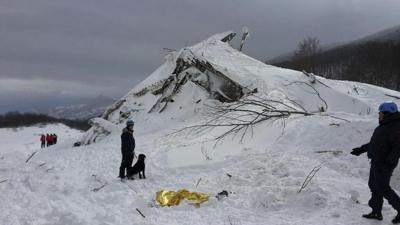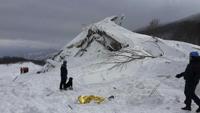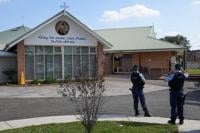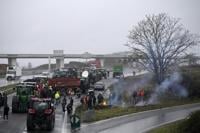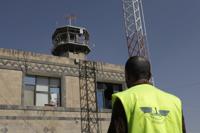ROME (AP) — An Italian court on Thursday acquitted most of the defendants on trial over the deaths of 29 guests and staff when an avalanche buried an Apennine mountain hotel six years ago, Italian media, including state TV at the courthouse, reported.
Tons of snow raced down a forested slope and smashed into Hotel Rigopiano in the town of Farindola in Italy's central Abruzzo region on Jan. 18, 2017.
Prosecutors had alleged that local officials and administrators, as well as the hotel’s owner and manager, held various degrees of responsibility in the disaster.
Italian daily Corriere della Sera said 25 of the 30 defendants were acquitted of all charges, including manslaughter, while five defendants were convicted on relatively lesser charges, such as failure to clear the road for prompt rescue.
Shouts of “Shame, shame!” and “Murderers!” exploded from survivors and relatives of the dead in the courtroom in Pescara after the verdicts were read out.
In Italy, acquittals can be appealed, and it wasn't immediately known whether prosecutors would follow that option.
Andrea Piccoli, a lawyer for one of the 11 survivors, whose wife was among the dead, told state TV after the verdicts: “The fact that (the avalanche) couldn't be predicted prevailed" in the court's reasoning.
Among those convicted was Farindola's former mayor, who was sentenced to 2 years and 8 months for failing to issue an ordinance to evacuate the hotel and to prevent it from being occupied given its location on a slope susceptible to avalanches, Corriere said.
Two officials of the province that included the hotel's area were convicted of failing to properly monitor road conditions and remove snow on the road and sentenced to 3 years and 4 months each, Italian media said. Six-month sentences were meted out to a former hotel manager, convicted of making false statements, and to the technical expert who had signed off on work on the canopies and verandas of the hotel, Corriere della Sera said.
Waiting for the verdicts, survivors and relatives of the dead draped white T-shirts, each decorated with a photo of each victim, on 29 chairs in the courtroom.
The trial began in 2019, and suffered several delays, including due to the COVID-19 pandemic.

